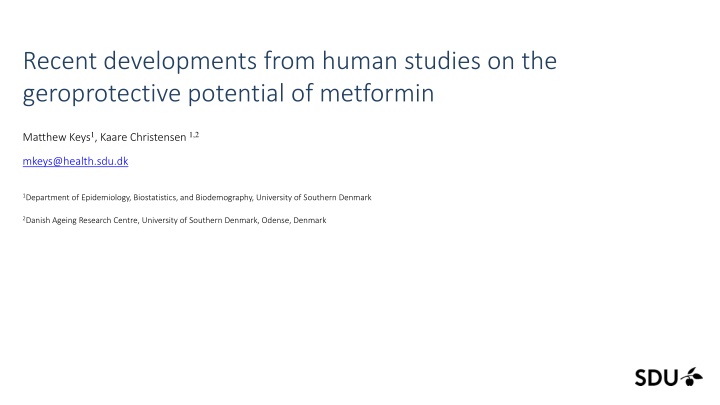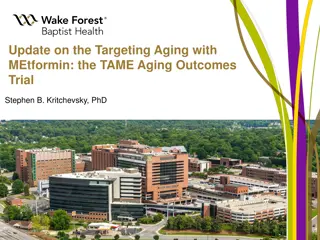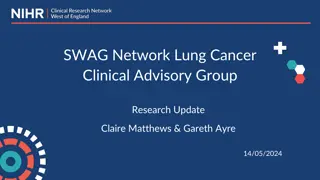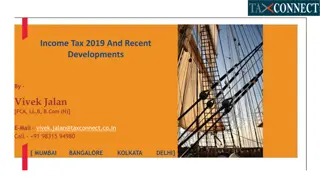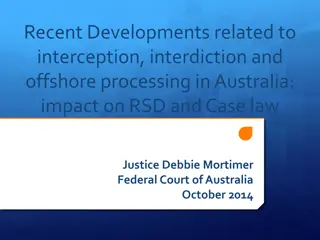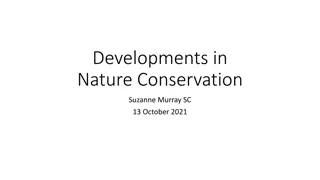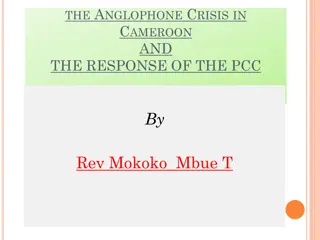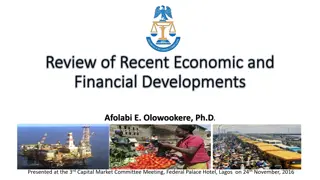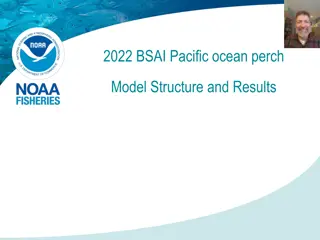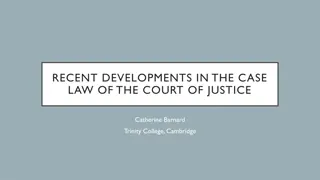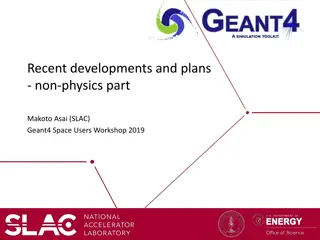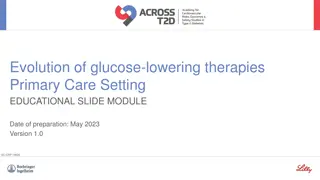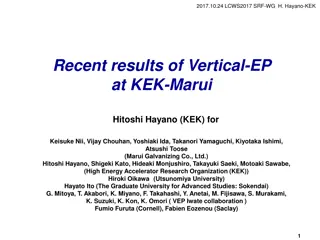Recent Developments on the Geroprotective Potential of Metformin in Human Studies
Recent human studies highlight the geroprotective potential of metformin in various conditions such as type II diabetes and cancer. Metformin has shown benefits in reducing all-cause mortality, macrovascular effects, and increased survival rates. However, concerns about study design and replication of findings warrant further investigation. The effects of metformin vary across different study designs and parameters, including treatment parameters, severity of diabetes, comorbidity, and health of controls.
Download Presentation

Please find below an Image/Link to download the presentation.
The content on the website is provided AS IS for your information and personal use only. It may not be sold, licensed, or shared on other websites without obtaining consent from the author.If you encounter any issues during the download, it is possible that the publisher has removed the file from their server.
You are allowed to download the files provided on this website for personal or commercial use, subject to the condition that they are used lawfully. All files are the property of their respective owners.
The content on the website is provided AS IS for your information and personal use only. It may not be sold, licensed, or shared on other websites without obtaining consent from the author.
E N D
Presentation Transcript
Recent developments from human studies on the geroprotective potential of metformin Matthew Keys1, Kaare Christensen1,2 mkeys@health.sdu.dk 1Department of Epidemiology, Biostatistics, and Biodemography, University of Southern Denmark 2Danish Ageing Research Centre, University of Southern Denmark, Odense, Denmark
Metformin in type II diabetes Metformin o Lower all-cause mortality (UKPDS) o Most prescribed oral hypoglycaemic agent worldwide Macrovascular effects o Substantial reduction in risk (UKPDS) o Corroborated in later trials (HOME & SPREAD-DIMCAD) Observational studies of cancer o 30-40% reductions in incidence and mortality (early meta-analyses) o Pronounced chemopreventative and chemotheraputic effects Effects beyond what are likely to be explained by glycaemic control
Bannister et al. (2014) 15% increased survival overall after adjustment for baseline cardiovascular prophylaxis 15% increased survival overall after adjustment for baseline cardiovascular prophylaxis
Warrant for replication of Bannister et al. (2014) Methodological concerns in study design: o Informative censoring of metformin initiators o Selection of never-exposed controls Artificially higher survival in metformin initiators relative to controls Selective reporting of results:
Survival in general population and discordant twins in Denmark M Keys, M Thinggaard, LA Larsen, DA Pedersen, J Hallas, K Christensen; International Journal of Epidemiology (2022) https://doi.org/10.1093/ije/dyac200
No advantage across range of cumulative use M Keys, M Thinggaard, LA Larsen, DA Pedersen, J Hallas, K Christensen; International Journal of Epidemiology (2022) https://doi.org/10.1093/ije/dyac200
Cohort comparisons Epidemiological explanations? o Treatment parameters o Severity of diabetes o Degree of comorbidity o Health of controls Methodological explanations? o Three study designs o Replicaiton of Bannister methods o Extensive sensitivity analyses Methodological and epidemiological parameters do Methodological and epidemiological parameters do not explain our differential findings not explain our differential findings
Population perspective Type II diabetes o Reduced life expectancy by 6 years o Vascular and non-vascular diseases Can mortality be normalised? o Optimal control of key risk factors o No excess risk of mortality o Achieved by only 5% of patients Metformin monotherapy unlikely to achieve effects of this magnitude Metformin monotherapy unlikely to achieve effects of this magnitude
Metformin in observational studies Time-related biases Immortal time bias Time-window bias Time lag and latency o o o 166 out of 176 studies, low or critically low quality 166 out of 176 studies, low or critically low quality according to AMSTAR 2 criteria according to AMSTAR 2 criteria More than 75% of meta More than 75% of meta- -analyses of observational studies analyses of observational studies were were critically low quality critically low quality
Metformin as an adjuvant in cancer trials 22 RCTs, 5943 participants 22 RCTs, 5943 participants Mix of phase II & III 3649 participants from MA.32 o o No effect of metformin: No effect of metformin: o PFS (HR = 0.97 [0.82, 1.15]) o OS (HR = 0.98 [0.86, 1.13]) What about prevention? What about prevention?
Long term followup in Diabetes Prevention Program RCT: RCT: lifestyle, metformin & placebo After trial completion: Modified lifestyle program for all Continuation of metformin o o 21 year median follow-up, 453 deaths No effect of metformin: No effect of metformin: All All- -cause mortality cause mortality Cancer mortality Cancer mortality CVD mortality CVD mortality CVD events CVD events o o o o
Metformin as cardioprotective in nondiabetics Cardiovascular effects o Basic risk factors o Atherosclersosis (CAMERA) o CABG surgery (MetCAB) o Mycocaridal infarction (GIPS-III) No hard data for assessing efficacy against CVD events Meta-analyses including smaller trials o More optimistic conclusions o Selection for prediabetes/met syndrome VA VA- -IMPACT IMPACT
Metformin in COVID-19: COVID-OUT & TOGETHER z Primary endpoint Primary endpoint: HR = 0.84 (0.66, 1.09) Primary endpoint Primary endpoint: RR = 1.14 (0.73, 1.81) ER visit, hospitalisation, or death ER visit, hospitalisation, or death: HR = 0.58 (0.35, 0.94) No effects on secondary outcomes No effects on secondary outcomes ACTIV ACTIV- -6 Trial recruiting metformin arm 6 Trial recruiting metformin arm
Whats next for metformin? State of the evidence o Reproducibility of key findings o Quality of meta analyses o RCTs as a cancer adjuvant o RCTs for cardioprotection o RCTs for COVID-19 o No chemopreventive effects Argument: Argument: Only further clinical trials can definitely clarify the geroprotective potential of metformin 1. Should the original justification and rationale be revisited? 1. Should the original justification and rationale be revisited? 2. What would the implications be of no observed effect of metformin? 2. What would the implications be of no observed effect of metformin?
Thanks! mkeys@health.sdu.dk
COVID-OUT: Secondary outcome results by wave Cohort parameters Similar age at baseline across Tx groups 87%+ participants evaluated during delta and omicron in all groups Metformin vs controls HR = 0.58 (0.35, 0.94) o o o Risk in metformin controls 55% higher compared to ivermectin and fluvoxamine controls during delta 100-160% higher compared to ivermectin and fluvoxamine controls during omicron Secondary outcome results compiled from Figures 2A-C of Supplementary Appendix DOI: 10.1056/NEJMoa2201662
